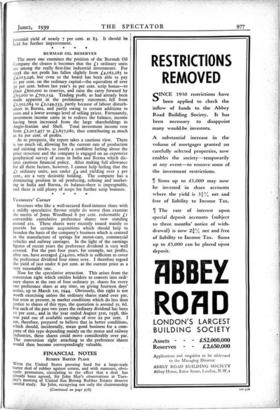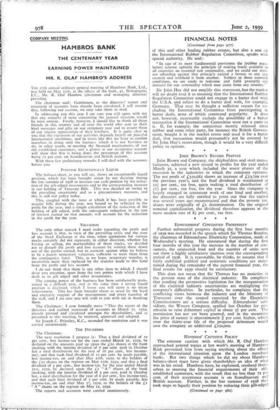FINANCIAL NOTES RUBBER BARTER PLANS
WITH the United States pressing hard for a large-scale barter deal of rubber against cotton, and with rumours, obvi- ously premature, circulating to the effect that a deal has already been agreed, Sir John Hay's observations at Tues- day's meeting of United Sua Betong Rubber Estates deserve careful study. Sir John, occupying not only the chairmanship
(Continued on page 978)
FINANCIAL NOTES
(Continued from page 977) of this and other leading rubber estates, but also a seat on the International Rubber Regulation Committee, speaks with special authority. He said:
" In one of its most fundamental provisions the (rubber regu- lation) scheme upholds the principle of making freely available to all countries an essential raw commodity, and we could not with- out offending against that princip!e extend a favour to any one country and withhold it from .another. Subject to these essential conditions, we are ready to welcome and fulfil promptly any demand for our commodity which may come from any country:'
Sir John Hay did not amplify this statement, but the market will no doubt read it as meaning that the International Rubber Regulation Committee could not engage in a barter deal with the U.S.A. and refuse to do a barter deal with, for example, Germany. That may be thought a sufficient reason for ex- cluding the International Committee from participating in barter deals, none of which command popularity. It does not, however, necessarily exclude the possibility of a barter transaction if the International Committee were not a party to it. If, for example, the committee merely released extra rubber and some other party, for instance the British Govern- ment, bought it in the market terms and used it for a barter deal, that transaction would presumably not be covered by Sir John Hay's reservation, though it would be a very difficult policy to operate.











































 Previous page
Previous page